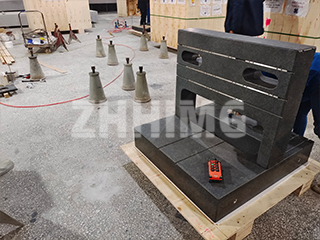Granite mechanical components serve as essential precision reference tools, widely applied in dimensional inspection and laboratory measurement tasks. Their surface can be customized with various holes and grooves—such as through-holes, T-slots, U-grooves, threaded holes, and slotted holes—making them highly adaptable for different mechanical setups. These customized or irregular-shaped granite bases are generally referred to as granite structures or granite components.
Over decades of production experience, our company has established a solid reputation in the design, manufacturing, and refurbishment of granite mechanical parts. In particular, our solutions are trusted by high-precision sectors such as metrology laboratories and quality control departments, where extreme accuracy is a must. Our products consistently meet or exceed tolerance standards thanks to stable material selection and strict quality control.
Granite mechanical parts are made from natural stone formed over millions of years, resulting in excellent structural stability. Their accuracy remains virtually unaffected by temperature variations. According to Chinese standards, granite mechanical components are graded into Grade 0, Grade 1, and Grade 2, depending on required precision.
Typical Applications and Characteristics
Wide Industrial Usage
Granite mechanical parts are extensively used across industries such as electronics, automotive, machinery, aerospace, and precision manufacturing. Designers often prefer them over traditional cast iron plates due to their superior thermal stability and wear resistance. By integrating T-slots or precision bores into the granite base, the application range expands significantly—from inspection platforms to machine foundation components.
Precision & Environmental Considerations
The level of precision defines the operating environment. For example, Grade 1 components can operate under standard room temperature, while Grade 0 units typically require climate-controlled environments and pre-conditioning before use to maintain the highest measurement accuracy.
Material Differences
The granite used in precision components differs from decorative building granite.
Precision-grade granite: Density of 2.9–3.1 g/cm³
Decorative granite: Density of 2.6–2.8 g/cm³
Reinforced concrete (for comparison): 2.4–2.5 g/cm³
Example: Granite Air Floating Platform
In high-end applications, granite platforms are combined with air-bearing systems to create air-floating measurement platforms. These systems use porous air bearings installed on precision granite rails to enable frictionless motion, ideal for two-axis gantry measurement systems. To achieve the required ultra-flatness, the granite surfaces undergo multiple rounds of precision lapping and polishing, with constant temperature monitoring using electronic levels and advanced measuring tools. Even a 3μm difference can arise between measurements taken in standard vs. temperature-controlled conditions—highlighting the critical role of environmental stability.
Post time: Jul-29-2025

